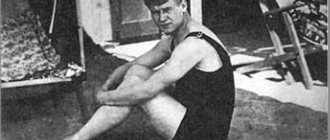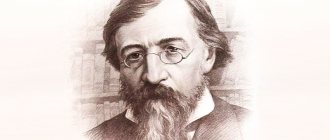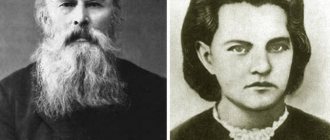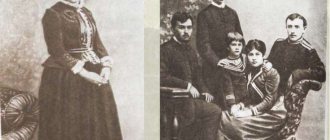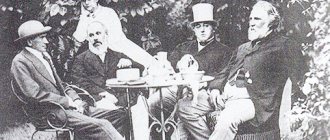Chingiz Aitmatov is a Kyrgyz and Russian writer, prose writer, screenwriter and diplomat. Aitmatov's works have been translated into hundreds of languages.
Over the years of his biography, he was awarded many prizes and awards given to him for his significant contribution to the development of literature.
So, here is a short biography of Chingiz Aitmatov .
Chingiz Torekulovich Aitmatov short biography. Chingiz Aitmatov: biography, creativity, family
Brief biography of Chingiz T. Aitmatov (December 12, 1928 - June 10, 2008).
Chingiz Torekulovich Aitmatov (1928-2008) - Kyrgyz and Russian writer, diplomat, academician of the Academy of Sciences of the Kyrgyz SSR (1974), Hero of Socialist Labor (1978), Laureate of the Lenin Prize (1963) and three State Prizes of the USSR (1968, 1977, 1983), Hero of the Kyrgyz Republic (1997).
Childhood and adolescence.
Chingiz Aitmatov was born on December 12, 1928 in the village of Sheker, Talas region of the Kirghiz Autonomous Soviet Socialist Republic in the family of peasant activist and party worker Torekul Aitmatov (1903-1938). His father was a prominent statesman, but fate was unkind to him; in 1937 he was repressed, and in 1938 he was shot. Nagima Khamzievna Abduvalieva (1904-1971), Chingiz’s mother, was an army political worker and public figure. The family spoke both Kyrgyz and Russian, and this determined the bilingual nature of Aitmatov’s work. Chingiz grew up in Sheker. During the Great Patriotic War, at the age of fourteen, he became secretary of the council in the village.
After the war he graduated from the Dzhambul Veterinary College, and from 1948 to 1953 he was a student at the Kyrgyz Agricultural Institute.
The creative biography of Chingiz Aitmatov began on April 6, 1952 - his story in Russian “The Newsboy Juido” was published in the newspaper “Komsomolets of Kyrgyzstan”. After that, he published stories in Kyrgyz and Russian. After graduating from the institute, Chingiz Aitmatov worked as a veterinarian for three years, but continued to write and publish his stories. From 1956 to 1958 he studied in Moscow at the Higher Literary Courses.
In 1957, the story “Face to Face” by Chingiz Aitmatov in the Kyrgyz language was published in the magazine “Ala-Too”, and in 1958 in the author’s translation into Russian in the magazine “October”. In 1957, the story “Jamilya” was also published for the first time, translated by Louis Aragon into French; later this story was published in Russian and brought Aitmatov world fame.
For 6 years (1959-1965) Aitmatov worked as editor-in-chief of the magazine “Literary Kyrgyzstan”, and at the same time was his own correspondent for the newspaper “Pravda” in the Kyrgyz SSR.
In the 1960s, his stories “The Camel’s Eye” (1960), “The First Teacher” (1961), “Mother’s Field” (1963) and the collection “Tales of Mountains and Steppes” (1963) were published, for which Aitmatov received the Lenin Prize . In 1965, his story “The First Teacher” was filmed by Andrei Konchalovsky at Mosfilm, and “Camel’s Eye” was filmed by Larisa Shepitko with Bolot Shamshiev in the title role. Subsequently, it was Shamshiev who became one of the best directors for film adaptations of the works of Chingiz Aitmatov.
In 1966, the story “Farewell, Gyulsary!” was written, which was awarded the State Prize. After this story, the writer began to write mainly in Russian. In 1970, his novel “The White Steamship” was published in Russian, which received recognition throughout the world, and its film adaptation was presented at international film festivals in Venice and Berlin. “Climbing Mount Fuji,” a collaboration between Aitmatov and Kazakh playwright Kaltai Mukhamedzhanov, written in 1973, is still performed on theater stages in Kazakhstan.
In 1975, Chigiz Aitmatov received the Toktogul Prize for his story “Early Cranes”. The story “The Piebald Dog Running by the Edge of the Sea,” published in 1977, became one of his favorite works in the GDR and was filmed by Russian and German filmmakers.
For his works, Aitmatov was awarded the USSR State Prize three times (1968, 1980, 1983).
For the novel “And the Day Lasts Longer than a Century,” published in 1980, the writer receives a second state prize. His novel “The Scaffold” became the last work published in the USSR. During his visit to Germany, Aitmatov met the German translator Friedrich Hitzer, with whom he worked until January 2007 (Hitzer suddenly died of a heart attack). All of Aitmatov’s post-Soviet works were translated into German by Friedrich Hitzer and published by the Swiss publishing house Unionsverlag. In 2011, Friedrich Hitzer was awarded posthumously the International Chingiz Aitmatov Prize for his long-term work with the writer, for his love for his work and devotion to him.
In 1998, the writer was once again awarded the title of Hero of Kyrgyzstan and recognized as a People's Writer in his homeland.
In post-Soviet times, “The White Cloud of Genghis Khan” (1992), “Cassandra’s Brand” (1994), and “Fairy Tales” (1997) were published abroad. "Childhood in Kyrgyzstan" (1998) and "When the Mountains Fall" ("Eternal Bride") in 2006 (in German translation in 2007 - under the title "Snow Leopard"). This was Aitmatov's last work.
The works of Chingiz Aitmatov have been translated into 174 languages, and the total circulation of his works is 80 million.
The question of awarding Aitmatov the Nobel Prize arose twice, but unfortunately, he was never awarded it. In the late 80s, according to the professor, chief Aitmatov expert of the republic, vice-president of the National Academy of Sciences Abdyldazhan Akmataliev, during Aitmatov’s trip to Austria, a representative of the Nobel Committee found the writer in Vienna, informed him that he had been awarded the Nobel Prize and congratulated him. “However, before the official announcement of the award, the Nobel Committee for the first time in its history was forced to hastily change its initial decision, since it was decided to award the Nobel Peace Prize to Mikhail Gorbachev. It was impossible for two representatives of the USSR to receive a bonus in the same year,” Akmataliev said.
Literature
The writer’s creative biography began on April 6, 1952 with the story “The Newsboy Juido” published in the newspaper “Komsomolets of Kyrgyzstan”. Aitmatov wrote his first literary text in Russian, one of his two native languages. After graduating from the institute in 1953, Chingiz Aitmatov, a senior livestock specialist at the Kyrgyz Research Institute of Animal Husbandry, continued to write stories in Russian and Kyrgyz, publishing texts in local publications.
In 1956, he decided to improve his skills as a writer and went to Moscow, where he entered the Higher Literary Courses. In parallel with his studies, he wrote a lot. Already in June 1957, the Ala-Too magazine published the young writer’s first story, “Face to Face.” In the same year, “Djamilya” was published - it is interesting that the story that made the writer famous was first published in translation into French.
The writer completed literary courses in 1958. By the time he received his diploma, two novellas and short stories had been published in Russian. Aitmatov's first novel will be published only in 1980. The novel “And the Day Lasts Longer than a Century” interweaves the realistic events of the life of Buranny Edigei with the fantastic line of contact between humanity and an alien civilization. One gets the impression that it is easier for people to reach an understanding with aliens than to reach an agreement among themselves.
The writer returned to the science fiction genre for the second time in the mid-nineties, writing “Cassandra’s Brand,” a story about the creation of artificial people. The remaining works are written in the genre of realism. In the Soviet Union, realism was socialist, but for socialist realism Aitmatov is too pessimistic. His heroes live and suffer for real, without turning into cheerful builders of communism.
The main character of The White Steamer, a boy who believes in fairy tales, dies when his Deer is killed. In general, folk tales and legends are an important part of Aitmatov’s plots. Mythological images sometimes turn out to be brighter than the main characters. From the legend about harsh invaders who turned captives into slaves, deprived of independence and memory, the word and concept “mankurt” - a person who has forgotten his roots - migrated into the Russian language.
Ai's second novel, published in 1986. During this period, Mikhail Gorbachev began Perestroika in the USSR, and it became possible to write about the country's problems. But even against the backdrop of permitted publicity, “The Scaffold” produces a striking effect - the novel raises several pressing issues at once, talks about drug addiction and corruption, about faith and church ministers.
Biography
Chingiz Aitmatov became a cited classic of world literature during his lifetime. He wrote in Russian and Kyrgyz, his works have been translated into more than 150 languages. The writer’s realistic prose is permeated with the ideas of humanism and a great love for all living things: people, wild and domestic animals, plants and the entire planet Earth.
Chingiz Aitmatov
People's Writer of Kyrgyzstan and Kazakhstan. Winner of the Lenin Prize and three State Prizes of the USSR, the European Literary and International Jawaharlal Nehru Prize. In 2007, he received the highest award from the Turkish government for his contribution to the development of the culture of Turkic-speaking countries. In the spring of 2008, Turkey began the process of nominating the writer for the Nobel Prize, but did not have time.
Childhood and youth
Chingiz Torekulovich Aitmatov was born on December 12, 1928 in the family of communists Torekul Aitmatov and Nagima Khamzievna Aitmatova (nee Abduvalieva) in the village of Sheker, Kara-Buura (Kirov) district, Talas canton of the Kyrgyz Autonomous Soviet Socialist Republic. After the birth of Chingiz, the family moved to the city because the father was promoted: since 1929, Torekul Aitmatov’s career has been rapidly rising.
Writer Chingiz Aitmatov
In 1933, he was already the second secretary of the Kyrgyz regional committee of the CPSU (b). In 1935, the young leader became a student at the Institute of Red Professorship in Moscow, and the family also moved to the capital of the USSR. During this time, Nagima gave birth to her husband’s son Ilgiz, twins Reva and Lucia (the boy died in infancy) and daughter Rosa. In 1937, at the insistence of her husband, Nagima Khamzievna moved the children to relatives in Sheker.
The father of the future writer was arrested in September 1937 on suspicion of anti-Soviet nationalist activities and was transported to Frunze (the capital of Soviet Kyrgyzstan). On November 5, 1938, he was shot. The wife of the “enemy of the people” was deprived of her rights, but all the children of the repressed political worker received a higher education and each wrote their own page in history.
Chingiz Aitmatov in his youth
During the Second World War, all adult men were mobilized, and fourteen-year-old Chingiz turned out to be one of the most literate people in the village and took the post of secretary of the village council. After the war, the young man was able to continue his studies: after a rural eight-year school, he graduated with honors from the Dzhambul Zootechnic School and in 1948 entered the Kyrgyz Agricultural Institute in Frunze.
Close relatives
Chingiz Aitmatov was born on December 12, 1928. Place of birth: Sheker village in the northwestern part of Kyrgyzstan.
Torekul Aitmatov (1903–1938) was a prominent public figure. From 1925, when the young man joined the Russian Communist Party, until the end of his life he held responsible positions in party bodies. In 1937 he was arrested on trumped-up charges of nationalism and executed by firing squad a year later.
Nagima Khamzievna (1904–1971), the mother of the future writer, until 1937 actively worked in the Komsomol and fought for the emancipation of women in the Soviet Central Asian republics. Then she worked as an accountant. After retiring, the woman has been involved in social activities since 1954.
Chingiz Aitmatov with his parents
In addition to Chingiz, the family raised three children:
- Ilgiz was born in 1931, graduated from the Geological Exploration Institute in Moscow. He wrote 280 scientific papers, became a Doctor of Technical Sciences, and an academician of the Kyrgyz National Academy of Sciences.
- Lucia (1934–1995) graduated from the Faculty of Energy of the Polytechnic Institute in Frunze. Aitmatova’s sister became the first female energy engineer in Kyrgyzstan.
- Rosetta was born in 1937. After graduating from the Kyrgyz Women's Pedagogical Institute, the girl remained as a teacher at the educational institution and completed graduate school. His career was devoted to training teachers for schools. In retirement, she is involved in the women's rights movement.
Chingiz Aitmatov in his youth
Personal life
The writer admired female beauty and deeply understood female character. Proof of this is the authentically and vividly depicted images of women in the books of Chingiz Aitmatov: the strong Jamilya from the story of the same name, the young romantic Asel (“My Poplar in a Red Scarf”), the wise Tolgonai, who lost her sons in the war, but retained the inner beauty of her soul (“Mother’s Field”) ").
Chingiz Aitmatov with his wife Kerez, sons Sanzhar and Askar
In almost every work there is that woman whose appearance on the pages of the book makes the soul of the main character or reader brighten. And in the life of the writer, female beauty played an important role. Chingiz met his first wife, Kerez Shamshibaeva, while studying at the Agricultural Institute. The girl studied at a medical institute and was also interested in literature.
After school, excellent student Kerez even received a referral to the Moscow Literary Institute, but financial circumstances did not allow her to leave. Kerez Shamshibaeva became an excellent doctor and leader; she worked at the Ministry of Health of Kyrgyzstan. She gave birth to two sons. Sanjar Chingizovich was born in 1954, he is a journalist, writer, and businessman. Askar Chingizovich was born in 1959, became an oriental historian and public figure.
Chingiz Aitmatov and Byubyusara Beishenalieva
At the end of the fifties, Chingiz Aitmatov met the main love of his life - ballerina Byubyusara Beishenalieva. The novel began in Leningrad and lasted fourteen years. The lovers could not get married: the high position of both required adherence to decency. A communist could not just divorce his wife for the sake of marrying the People's Artist of the USSR, whom the first people of the state were courting.
The writer’s experiences found a way out in his works. Tanabai is tormented by the need to make a choice between his wife and his mistress in the story “Farewell, Gyulsary.” Buranny Edigei falls in love with his friend’s widow in the novel “And the Day Lasts Longer than a Century.” In both works, women turn out to be more morally resilient than the lyrical hero, who is ready to run headlong for new love.
Second family of Chingiz Aitmatov
The secret relationship lasted fourteen years, about which there was a lot of gossip in the republic. Byubyusara Beishenalieva died on May 10, 1973 after a year and a half of struggle with breast cancer. Twenty years later, in collaboration with Mukhtar Shakhanov, Aitmatov wrote the book “Confession at the End of the Century” (second title “The Hunter’s Lament over the Abyss”), in which he frankly told the story of this love.
The second wife of Chingiz Torekulovich was Maria Urmatovna. By the time she met the famous writer, Maria had graduated from the screenwriting department of VGIK, had been married and given birth to a daughter, Cholpon. The second marriage produced a son, Eldar, and a daughter, Shirin. Eldar Chingizovich graduated from the Academy of Fine Arts in Belgium, he is a designer and artist, and runs the Aitmatov house-museum in Bishkek.
Aitmatov: personality, genius, era
Honorary Academician of the National Academy of Sciences of the Republic of Kazakhstan, Professor Erlan Aryn about the works of Chingiz Aitmatov.
One of the most vivid impressions of my student years was the first production of “Mother’s Field” by Chingiz Aitmatov, performed by Azerbaijan Mambetov on the stage of the Kazakh Drama Theater named after Auezov. The performance was sold out, and each time the hall seemed to fall into tense silence. After the end of the performance, the audience came out shocked by the action they had experienced in two hours.
The power of the author's talent of Chingiz Aitmatov was strengthened by the directorial talent of Azerbaijan Mambetov and the acting talent of the brightest star of Kazakh art, Sabira Maykanova, who was recognized as great during her lifetime. She served the theater for more than 60 years, created about fifty different characters on stage, for which she was awarded the title of People's Artist of the USSR, but the role of Tolganay from “Mother's Field” became her favorite. For this role, which the actress played during an aortic rupture, she was later awarded the State Prize.
ORIGINS OF CREATIVITY
Photo ©RIA Novosti
Decades have passed, but the atmosphere of that auditorium is still memorable to me. Living with Tolganay and her full dramatic fate. Catharsis that occurs only in contact with real art. This state was so close to the one experienced by the spectators in the darkness of the auditorium. This is a hymn to maternal love, maternal feat...
Since school years, we have been told about the seven wonders of the world, but, agree, what do the Egyptian pyramids and the Hanging Gardens of Babylon, beautiful creations of nature and human hands, mean in comparison with the greatest miracle on Earth - the love of a mother, boundless, sacrificial and devoted?
The theme of the feat of maternal love also sounds with a piercing culmination in Aitmatov’s novel “And the Day Lasts Longer than a Century,” which was published and reprinted many times both in the country and especially abroad. The mental anguish of a mother from separation from her son and the momentary joy from the slightest touch to him, looking at him, self-sacrifice and inescapable pain. Even dying from an arrow shot at her by her Mankurt son, Naiman-Ana does not lose hope of saving him. “Remember, whose are you? Your father is Donenby! - cries the bird, in which the white scarf of the dying mother is wrapped. What other miracle can compare with such a miracle of all-forgiving, all-conquering love? Only a mother's love is a priori selfless.
Thousands of literary works have been written about the work of Chingiz Aitmatov, who has gained worldwide fame as the author of philosophical novels and stories published in more than a hundred countries around the world, and hundreds of scientific dissertations have been defended. They scrupulously examine the stylistic features of his works, the characters of literary heroes, and national color, but, unfortunately, the origins of the formation and development of an extraordinary outstanding talent, a world phenomenon named Chingiz Aitmatov, are not often mentioned. What makes millions of readers empathize with his heroes and believe the sincerity of Aitmatov’s words?
The poignancy of the theme of maternal love in his works, and indeed the success of his masterpieces imbued with humanity, are associated with the most important person in his life - his mother, Nagima Khamzievna Aitmatova (nee Abduvalieva). It was to her, his mother, that the outstanding writer of the 20th century dedicated “Mother’s Field”.
“Mother is the beginning of the Motherland, Mother is the native language, Mother is the conscience tasted along with mother’s milk,” tell me what words of filial love and devotion will compare with this expression of Chingiz Torekulovich’s love for his mother in the article “Snows on Manas” “Ata”? Here it is - the beginning of all beginnings, the source of the great talent of a humanist writer.
Growing up in a wealthy family, Nagima Khamzievna graduated from the women's gymnasium of the city of Karakol; in 1925, she led the movement in Kyrgyzstan to emancipate Muslim women. When in 1937 her husband Torekul Aitmatov, a major party worker, was arrested and then shot, she was left with four children, the eldest of whom, Chingiz, was nine years old, the youngest daughter Rosetta was five and a half months old. With the stigma of being the wife of an “enemy of the people,” she endured the most difficult trials, and there was nowhere to wait for outside help—all male relatives, both on her husband’s side and on hers, were shot. Isn’t the feat of the writer’s mother, who raised and gave higher education to all her children in the most difficult life circumstances, akin to the feat of Tolganay from “Mother’s Field”? But she, who lost her husband, was only 34 years old. It’s time to start another family, as well-wishers advised her.
“Hail to our Mother! What courage, wisdom and devotion to her parental duty she possessed! “All the best in our lives and our destinies, including our education, was achieved thanks to her work and courage,” the writer wrote these words in those bitter days when his mother was struggling with death in a hospital bed...
They say that the way a man treats his mother, so he will treat the entire female race. It is a great benefit for others if a man’s mother is a symbol of spirituality and is associated with sympathy, acceptance, care, tranquility, the healing power of love and forgiveness, and with the special wisdom of the keeper of the shanyrak.
How many beautiful female characters were given to world literature by Aitmatov’s love for his mother! This is Seyde from the story “Face to Face”, for whose mother’s heart there is no one else’s grief, and the integral nature of Jamili, who does not tolerate lies, from his story of the same name, and pure, like the snow on the peaks of Alatoo, Asel from the story “My Poplar in a Red Scarf” “... In the character of each of the heroines is the character of the writer’s mother.
A woman as the beginning of world harmony, the personification of the spiritual principle... “You are higher than everyone, you are wiser than everyone! You are a Man! - says Tolganay, who herself is tormented by the confusion and mental disorder of her unreasonable children, who do not know her, their mother’s, worth.
Mother is Life itself, opposing Death. The world rested and continues to be held not on the shoulders of the mythical Atlanteans, but on the fragile mother’s shoulders. Maybe that’s why, no matter how dramatic and sometimes tragic the plots of Aitmatov’s works are, good in them still triumphs over evil...
REVIVING SPIRITUALITY
Photo ©RIA Novosti
The great Russian writer Leo Tolstoy said: “The great and noble mission of literature is to make a person love life and the world.” The works of Chingiz Aitmatov coped with this task in difficult times, when the official ideology, being the dominant force in society, latently encouraged historical oblivion, mankurtism, lack of spirituality, falsehood, ignorance and greed...
Today, as part of the implementation of the presidential program “Rukhani Zhangyru”, we turned to the phenomenon of the cultural and genetic code of the nation, which, in the figurative expression of the Head of State, makes any nation a nation, and not a collection of individuals.
Great writers anticipate tomorrow, ahead of their time. In search of harmonization of personality and society, nature and man, man and God, Aitmatov turned to the traditions and customs of the people, to the myths that wise ancestors left for edification... And these are not only Kyrgyz myths and legends. Remember the Georgian parable “Seven and One” in “The Scaffold”, or the story “The Piebald Dog Running by the Edge of the Sea”... From the cultural and genetic memory of the people, from the pure springs of their spirit, the writer drew strength to resist the lack of spirituality that undermined society.
Our ancestors, the ancient Turks, always treated animals with reverence, endowing them with human qualities. And in Aitmatov’s works, the world of animals coexists next to the world of people... This is the pacer Tanabai from “Farewell, Gyulsary!”, a wolf, a leopard, an eagle, a dog, a sheep, a camel from other works... To some extent, they are more humane and wiser than their elders brothers... The wise Mother Deer from “The White Steamship”, to whom the granddaughter of grandfather Momun, a seven-year-old thin dreamer, a boy, so often turns to, is how Akbar’s blue-eyed wolf from “The Scaffold” is inspired... This myth, as Aitmatov admitted, he once heard from mountain shepherds. And in the writer’s last novel, “When Mountains Fall,” the main character, in search of God and loneliness, finds his death along with a leopard... A man does not remain alone in a cave, sharing his last hours with a living creature.
What happens to all of us, as Aitmatov bitterly asks from the pages of his works, if we have so thoughtlessly lost touch with our ancestors, with our mother’s language, if we cannot even protect the graves of our grandfathers from desecration? What breakdown has occurred in our consciousness if, no longer hearing the groans of our smaller brothers, we direct arrows into the chest of Mother Earth, like mankurt Zholaman, and thoughtlessly destroy nature?
“As an artist who created works that will always be valued and read throughout the world, Aitmatov, at the same time, is an outstanding thinker who raised in his works the “great questions” of democracy, freedom and justice. Aitmatov is dear to the modern reader not only because he gave incomparable pictures of Kyrgyz national life and created first-class works of world literature, but also because, using artistic means, he skillfully exposed the vices of totalitarianism, in the shackles of which he himself lived and worked, through the fate of an individual man managed to depict the historical destinies of the entire people.
Aitmatov is truly amazing as a thinker. His worldview not only corresponds to the strength of his artistic genius, but, perhaps, sometimes exceeds his artistic gift.”
I understand that the text is very large for a quotation, but it is difficult to subtract anything from what was said by Zhumagul Saadanbekov, a well-known major state and public figure in Kyrgyzstan, a diplomat and political scientist, it is simply impossible. Being a great writer is incredibly difficult. Who will combine the past and present, hopes and passions, conscience and feelings of many people within himself, who will take upon himself the burden of responsibility for the impoverishment of souls?
HE SPEAK TO THE WHOLE WORLD
Photo ©RIA Novosti
Chingiz Aitmatov united a variety of people. His books “speak” in more than 176 languages of the world, published in 128 countries with a circulation of more than 100 million copies. According to UNESCO, he is considered one of the most read and published writers of the 20th century.
Ten years have passed since his departure, but I hope he did not leave the world without his supervision. Recently, re-reading his books, I was surprised how close his heroes of his early and late works are. Tananbay from “Farewell, Gyulsary!” dreamed of becoming a white mountain eagle after death, so that he could soar in the heights for hours and admire the panorama of the earth. Edigei from the novel “And the Day Lasts Longer than a Century” dreams that after death his soul will move into a white-tailed kite: “...to fly and look at his land from above.” Is this not the secret desire of the author himself? Be that as it may, you can still feel his visible presence today when rereading the works he left behind.
We can talk about Aitmatov endlessly. There are amazing things that were unlikely to happen in connection with other writers. For example, in one of the universities in India, a department of the Kyrgyz language was opened just to study the language of the works of Chingiz Aitmatov... Or the fact that the Germans republished “Farewell, Gyulsary!” 17 (!) times.
It would be possible to dwell in more detail on the close spiritual ties of Chingiz Torekulovich with his Kazakh fellow writers. Kaltai Mukhamedzhanov, Mukhtar Shakhanov, Olzhas Suleimenov, Zeinolla Kabdolov, Sherkhan Murtaza and many others, not counting Mukhtar Omarkhanovich Auezov, whom Aitmatov himself considered his Teacher.
No less interesting is Aitmatov’s role in the development of world cinema. The phenomenon of the “Kyrgyz miracle” is inextricably linked with the work of Chingiz Aitmatov, which gave a powerful impetus to national cinema. The whole world applauded the masterpieces of Kyrgyz cinema at the largest film festivals, among which Aitmatov’s works predominated.
But it still seemed to me more interesting to examine in detail the origins of the work of this outstanding writer, whose enormous faith in man never failed, no matter under what unsightly guises he may appear in various life circumstances. Aitmatov, whom journalist Tatyana Sinitsyna called in her article “a sage who dreamed of connecting all the “Babylonian” parts of humanity with the threads of his thoughts,” knew how to discern the essence of people with his heart. That’s why I believed in man, in humanity. As Exupery wrote, after all, only the heart is vigilant; you cannot see the most important thing with your eyes... This is only possible for great writers who, in their work, cross national, religious and other boundaries of conventions. World-famous writers for whom all people are one.
Death
Chingiz Aitmatov suffered from diabetes mellitus in the last years of his life, which did not prevent him from leading an active life. In 2008, the writer, in his eightieth year of life, went to Kazan to film the documentary “And the Day Lasts Longer than a Century,” which was filmed for the upcoming anniversary. On the set, the writer caught a cold, the cold turned into acute pneumonia, and his kidneys began to fail.
Monument to Chingiz Aitmatov
On May 16, Aitmatov was flown to Germany, but doctors were unable to save the patient. On June 10, Chingiz Torekulovich died at a Nuremberg clinic, and on June 14, a solemn farewell and funeral of the classic of world literature took place. So many mourners gathered that several people fell from the stairs leading to the theater where the coffin with the body stood. The help of the police and doctors was needed in order to avoid casualties.
Biography of Aitmatov
Chingiz Torekulovich Aitmatov was born on December 12, 1928 in the Kyrgyz village of Sheker.
His father, Torekul Aitmatov, was a member of the CPSU party and was an influential politician in the Kyrgyz SSR. Mother, Nagima Abduvalieva, was a military political worker and public figure.
The couple were ardent supporters of communism and did everything possible to promote the ideas of Lenin and Stalin.
In addition to Chingiz, the Aitmatovs had a boy, Ilgiz, a girl, Rosa, and twins, Lucia and Reva, the latter of whom died in infancy.
Childhood and youth
In 1933, the Aitmatovs moved to Moscow, as the father of the family was promoted. However, when 1937 arrived, the couple faced serious challenges.
On charges of anti-Soviet activities, Aitmatov Sr. was transferred back to Kyrgyzstan.
Chingiz Aitmatov in his youth
A year later he would be declared an enemy of the people and shot. In this regard, his wife, as the wife of an “enemy of the people,” will have to face various kinds of difficulties and infringements of her rights.
When Chingiz Aitmatov turned 14 years old, World War II began. Since the young man was quite educated, he was appointed to the position of secretary of the village council.
After the end of the war, he entered the Dzhambul Zootechnic School, from which he graduated with honors.
In 1948, Aitmatov successfully passed the exams at the Kyrgyz Agricultural Institute, where he studied for 5 years.
During this period of his biography, he began to write his first stories in a local newspaper. An interesting fact is that he wrote works equally well in both Russian and Kyrgyz languages.
The fate of the writer
During the war with Nazi Germany, when the men went to the front, Chingiz led the work of the village council in his native village. In 1945, soldiers return home. The teenager is graduating from eight-year school and intends to become a veterinarian. It turned out that the young man’s true calling was writing.
Significant dates in Aitmatov’s life:
- The young man received his secondary specialized education at the Dzhambul Zootechnic School , which he graduated in 1948 with honors.
- The first publication, the story “Ashym” in the Kyrgyz language, took place in 1952.
- In 1953, Chingiz received a diploma from the Kyrgyz Agricultural Institute, then worked as a veterinarian for 3 years.
- In 1956, the young man became a student at the Higher Literary Courses in Moscow, where he studied for 2 years.
- In the June issue of the magazine “October” for 1957, Ai’s story was published in Russian in the author’s translation.
- In 1958, the story “Jamilya” was published in the magazine “New World” , No. 8. Immediately after publication, Louis Aragon translates the work into French. The Kyrgyz writer gains worldwide fame.
- In 1959, Aitmatov joined the Communist Party of the Soviet Union.
- In 1963, Chingiz Torekulovich was awarded the Lenin Prize as the author of the collection “Tales of Mountains and Steppes” .
- In 1965, A. Konchalovsky filmed a film adaptation of the story Ai. A year later, the film received a silver medal at the Venice Film Festival. Actress N. Arinbasarova was awarded the Volpi Cup for the best performance of the leading female role.
- In 1966, he was awarded the State Prize for the story “Farewell, Gyulsary!” Starting from this work, Aitmatov writes in Russian.
- On August 31, 1973, the Pravda published a letter condemning the behavior of dissidents A. I. Solzhenitsyn and A. D. Sakharov. The letter bears the signatures of 31 Soviet writers, including Ch. Aitmatov.
- For the film “The White Steamer,” Chingiz Torekulovich is writing a script based on the story of the same name. In 1977, the writer’s work was awarded the second State Prize.
- In 1978, Ch. T. Aitmatov was awarded the title of Hero of Socialist Labor .
- The third State Prize was awarded to the writer in 1983 for the novel “And the Day Lasts Longer than a Century .
- The novel "The Scaffold" , published in 1986, became the last work that Aitmatov published in the USSR.
- From 1988 to 1990 worked as editor-in-chief of the magazine "Foreign Literature" .
- In 1990, he became the ambassador of the USSR (after the collapse of the Union - the ambassador of Russia) to the Grand Duchy of Luxembourg .
- 1994–2006 Chingiz Torekulovich heads the Embassy of the Kyrgyz Republic in the Benelux countries, and also represents the interests of Kyrgyzstan in NATO and UNESCO.
- In 2006, Aitmatov created the international foundation “Dialogue without Borders” . The purpose of the organization is to support the Russian language on the territory of the republics that were part of the Soviet Union. In the same year, the seventh issue of the magazine “Friendship of Peoples” published the novel “When Mountains Fall,” which became the writer’s last work.
- While filming the film based on the novel “And the Day Lasts Longer than a Century ,” which took place in Kazan in the spring of 2008, the writer fell ill with severe pneumonia. The disease occurred against the background of acute renal failure. The patient was transported to Germany for treatment.
- On June 10, 2008, Chingiz Torekulovich Aitmatov passed away.
- The funeral took place on June 14 at the cemetery of the Ata-Beyit memorial complex. This day was declared a day of national mourning in Kyrgyzstan.
Aitmatov's works
In 1956, Chingiz Aitmatov went to Moscow to enroll in the Higher Literary Courses. Thus, he wanted to improve his skills as a writer.
A year later, the stories “Face to Face” and “Jamila” came out from his pen, which brought Chingiz some popularity. An interesting fact is that he wrote his first novel only in 1980.
Aitmatov’s creative biography is dominated by works written in the genre of realism. However, he has many stories and novels with elements of fiction that he would write in a later period of his life.
Chingiz Aitmatov showed particular interest in folk art. He liked folk epics and legends, whose heroes fought against evil and injustice.
The main works in Aitmatov’s biography are considered to be the stories “Farewell, Gyulsary!” and “The White Steamship”, as well as the novels “Stormy Stop” and “The Scaffold”.
Personal life
Chingiz Aitmatov was married twice. The first wife in his biography was Kerez Shamshibaeva, whom he met as a student.
At that time, the girl was studying at a medical institute. Chingiz was attracted to her because, in addition to medicine, she was interested in literature.
Soon they decided to get married. In this marriage they had 2 boys - Sanjar and Askar.
Chingiz Aitmatov with his wife Kerez, sons Sanzhar and Askar
However, over time, Aitmatov lost interest in his wife, and as a result began dating the ballerina Byubusara Beishenalieva.
A whirlwind romance began between them that lasted 14 years. Aitmatov and Beishenalieva could not legitimize their relationship for a number of reasons.
Chingiz Aitmatov and Byubyusara Beishenalieva
A famous writer and communist did not have the right to simply leave his wife and start a family with another woman.
In turn, Bubusara, being a People's Artist of the USSR, could not marry a divorced man.
As a result, Aitmatov continued to live with his legal wife and date his mistress. The writer reflected his feelings that he experienced during that period of his biography in his own works.
Aitmatov ended up marrying Beishenalieva, because she died of breast cancer in 1973. The death of the ballerina was a real tragedy for Chingiz, which he experienced very painfully.
Second family of Chingiz Aitmatov
The second wife in Aitmatov’s biography was Maria Urmatovna, who already had a daughter from her first marriage. After the wedding, they had a boy, Eldar, and a girl, Shirin.
Family relationships
his first wife, Kerez Shamshibaeva (1930–1999), in Frunze, when the girl was studying at a medical institute. In 1953, the young people got married. The marriage produced two sons.
Sanzhar was born on April 22, 1954, and became a journalist. Askar was born on January 5, 1959. After graduating from the Institute of Asia and Africa, he worked at the Ministry of Foreign Affairs of Kyrgyzstan. From 2002 to 2005 he headed the ministry.
With his first wife Kerez and children
In 1974, Aitmatov married for the second time. The chosen one was Maria Urmatovna (1942–2021). The maiden name was taken in memory of her father, Nurmat Shatiev. The young woman worked in cinema as an assistant director and wrote scripts. Maria and Chingiz had a daughter and a son.
Shirin was born on July 28, 1977. She received her education in the USA and Japan and speaks fluent Russian, English, French, Japanese and Kyrgyz. From 2010 to 2015, the writer’s daughter was a deputy of the Supreme Council of Kyrgyzstan. After leaving politics, she went into business.
Eldar was born on December 1, 1979. After graduating from the Brussels Royal Academy of Fine Arts, he worked as a designer. In 2021, he starred in the film “Sayakbay. Homer of the 20th century”, where he played the role of young Aitmatov.
With his second wife Maria and children
Death
At the end of his life, Chingiz Aitmatov suffered from diabetes. In 2008, he went to Tatarstan to film the film “And the Day Lasts Longer than a Century.” The premiere of the film was supposed to take place on the anniversary of the classic.
On one of the shooting days, Aitmatov caught a serious cold. The disease began to progress, and soon developed into acute pneumonia.
This led to kidney failure, as a result of which the writer was urgently sent for treatment to Germany. A month later, it became clear to doctors that Aitmatov could no longer be saved.
Chingiz Aitmatov died on June 10, 2008 at the age of 79. He was buried in the Ata-Beyit cemetery, near the capital of Kyrgyzstan.
An interesting fact is that the writer chose the place of his future burial back in the 90s of the last century, when he learned that the body of his executed father, Torekul Aitmatov, rested in this cemetery.
